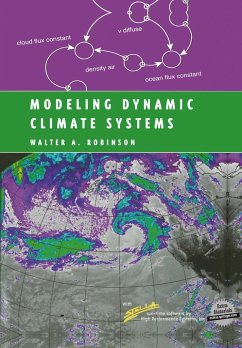The dynamics of the atmosphere, ocean, and climate are inherently nonlinear and complex, making computer models ideal for accurate, complete understanding of these systems. In the process of building and using models, the reader of this book will learn how the different components of climate systems function, interact with each other, and vary over time. Topics covered include the stability of climate, earth's energy balance, parcel dynamics in the atmosphere, the mechanisms of heat transport in the climate system, and mechanisms of climate variability. Special attention is given to the effects of climate change. The book is accompanied by a cross-platform CD containing models and a run-time version of STELLA (R) software.
The world consists of many complex systems, ranging from our own bodies to ecosystems to economic systems. Despite their diversity, complex sys tems have many structural and functional features in common that can be effectively modeled using powerful, user-friendly software. As a result, vir tually anyone can explore the nature of complex systems and their dynam ical behavior under a range of assumptions and conditions. This ability to model dynamic systems is already having a powerful influence on teaching and studying complexity. The books in this series will promote this revolution in "systems think ing" by integrating skills of numeracy and techniques of dynamic modeling into a variety of disciplines. The unifying theme across the series will be the power and simplicity of the model-building process, and all books are de signed to engage readers in developing their own models for exploration of the dynamics of systems that are of interest to them. Modeling Dynamic Systems doesnot endorse any particular modeling paradigm or software. Rather, the volumes in the series will emphasize sim plicity of learning, expressive power, and the speed of execution as priori ties that will facilitate deeper system understanding.
The world consists of many complex systems, ranging from our own bodies to ecosystems to economic systems. Despite their diversity, complex sys tems have many structural and functional features in common that can be effectively modeled using powerful, user-friendly software. As a result, vir tually anyone can explore the nature of complex systems and their dynam ical behavior under a range of assumptions and conditions. This ability to model dynamic systems is already having a powerful influence on teaching and studying complexity. The books in this series will promote this revolution in "systems think ing" by integrating skills of numeracy and techniques of dynamic modeling into a variety of disciplines. The unifying theme across the series will be the power and simplicity of the model-building process, and all books are de signed to engage readers in developing their own models for exploration of the dynamics of systems that are of interest to them. Modeling Dynamic Systems doesnot endorse any particular modeling paradigm or software. Rather, the volumes in the series will emphasize sim plicity of learning, expressive power, and the speed of execution as priori ties that will facilitate deeper system understanding.
From the reviews:
"This is a useful textbook on numerical simulation of fluid motions in a context of their application in various aspects of atmospheric dynamics relevant to global climate models. The author s aim is not to focus on numerical techniques and mathematical details, instead the reader is approached by clear and readable descriptions of physical processes involved in a particular atmospheric phenomenon." (Vladimir Cade , Zentralblatt MATH, Vol. 995 (20), 2002)
"This book is the seventh volume in the series Modeling Dynamic Systems . If you are serious with climate modeling, you will love this book. In my view, it marks a real progress as compared to other recent textbooks on much the same topic . The best aspect of the book is the beautifully balanced view of the global climate. So, a fine slim book, well embedded into other system modeling treatments, and worth its price." (Michael Hantel, Metereologische Zeitschrift, Vol. 11 (1), 2002)
"Modelling Dynamic Climate Systems attempts to guide the reader into an appreciation of complex feedback couplings by considering a spectrum of simple models of climate and climate processes. Modelling Dynamic Climate Systems is an appropriate laboratory companion to a more formal treatment of climate dynamics. Robinson s contribution to the series Modeling Dynamic Systems provides a basis for developing, through experimentation, a sound conceptual intuition of the (at times) intricate balance between multiple physical processes operating within the climate system." (David Noone, Australian Meteorological Magazine, Vol. 51 (1), 2002)
"This is a useful textbook on numerical simulation of fluid motions in a context of their application in various aspects of atmospheric dynamics relevant to global climate models. The author s aim is not to focus on numerical techniques and mathematical details, instead the reader is approached by clear and readable descriptions of physical processes involved in a particular atmospheric phenomenon." (Vladimir Cade , Zentralblatt MATH, Vol. 995 (20), 2002)
"This book is the seventh volume in the series Modeling Dynamic Systems . If you are serious with climate modeling, you will love this book. In my view, it marks a real progress as compared to other recent textbooks on much the same topic . The best aspect of the book is the beautifully balanced view of the global climate. So, a fine slim book, well embedded into other system modeling treatments, and worth its price." (Michael Hantel, Metereologische Zeitschrift, Vol. 11 (1), 2002)
"Modelling Dynamic Climate Systems attempts to guide the reader into an appreciation of complex feedback couplings by considering a spectrum of simple models of climate and climate processes. Modelling Dynamic Climate Systems is an appropriate laboratory companion to a more formal treatment of climate dynamics. Robinson s contribution to the series Modeling Dynamic Systems provides a basis for developing, through experimentation, a sound conceptual intuition of the (at times) intricate balance between multiple physical processes operating within the climate system." (David Noone, Australian Meteorological Magazine, Vol. 51 (1), 2002)








